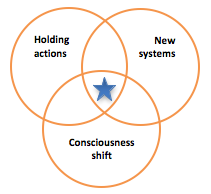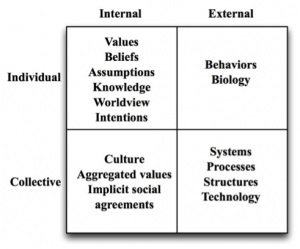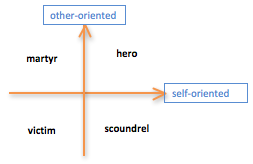Learning to transition

Door Inge Schrijver
Two months ago I arrived in the tiny town of Totnes – or rather the even tinier Dartington village right outside Totnes – in Devon, England, to start my Master’s in Economics for Transition at Schumacher College. Please don’t freak out about the word ‘economics’, this programme looks nothing like whatever just came to your mind and I won’t be throwing economics at you (yet…).
The first module, The Ecological Paradigm, just ended and I have learned so incredibly much. I am very grateful to have the opportunity to be here and would like to share some insights to try to have you take part in it. This is my first attempt; hopefully a kick-off for more to come in the following months.
The great turning
Throughout the first module, the work of Joanna Macy was interwoven. I had not heard of this woman before, but she is fantastic: as an author, environmental activist, Buddhist scholar and much more. She calls the time we now live in the ‘Industrial Growth Society’ and gives three stories to see the world through:
- Business as usual: everything is just going on as normal.
- The great unravelling: everything is unravelling.
- The great turning: everywhere we see examples of positive change, transitions to a Life Sustaining Society.

Figure 1: In the great turning, to transition to a Life Sustaining Society, we need people performing different roles
Often I see through story number 2 and it is not a happy mind-set. Story 3 on the other hand is quite uplifting. Further, Macy says that instead of having hope, we should be hope, and coined the term ‘active hope’. These two insights, along with being in a room filled with people who are hope greatly boosted my energy.
Another useful insight was that for the great turning different roles are needed from people (see figure 1). We need people who do ‘holding actions’, which is preventing the situation from getting worse; people who work on shifting consciousness; and people who work on creating new systems and alternatives. Transition happens when all three roles are addressed. This is important for the environmental movement I think: not to fight others who have a different approach, but to value everyone’s contribution towards transition.
In class we did an interesting exercise where we divided the room in three corners according to the roles. Everyone went to stand along the role they work mostly in at the moment and then moved to where they would like to be in the future. Seeing the diversity in the room was very powerful. It is also possible to do this just by yourself and I would recommend it. Take some time to think of where you are now, where you were before and if you want to shift or are happy where you are now. You can repeat this every once in a while.

Figure 2: Wilber’s four quadrants. (Source: http://integralleadershipreview.com/7046-integral-leadership-and-diversity-definitions-distinctions-and-implications/)
Being a hero
Totnes is the founding town of the Transition Town Movement and in our first week we had class about inner transition from Sophy Banks. Looking at Wilber’s four quadrants (figure 2) we can see human experience along two axes: internal-external, and individual-collective. Most movements or organisations tend to stick to one quadrant, e.g. changing the food or energy system, or changing individual behaviour. Sophy argues that a holistic approach is needed, an inner and outer transition. Many people who are active for social or environmental causes get a burn-out, because they neglect the internal-individual quadrant. Or organisations work on issues in society, but don’t apply their own philosophy to their internal-collective sphere.
We discussed something similar at the end of the module and, while I don’t want to get repetitive, this was worded so beautifully that I think it is worth to do so. (And it makes a pretty heading for this paragraph.) You can be other-oriented and self-oriented and these are not mutually exclusive. Rather, instead of being either the one or the other, or neither, you are being a hero if you can focus on both other and self (figure 3). So please, go ahead and change the world while changing and taking good care of yourself and the group around you.

Figure 3: Please be a hero, both self- and other-oriented! (This idea comes from Colin Beavan and his work on ‘How to be alive?’)
This is not the truth
That was actually the first thing Sophy Banks wrote on the flip-over before starting class and I repeat it to myself every now and then. Our personal truth arises from our own stories, histories, worldviews and what more. What you say and think might be true for you, but it is incredibly valuable to realise it is not the only truth, that others have their truth originating from their experience.
This is something that comes back frequently in our lectures here. Try to approach life as an inquiry. Try to see with new eyes, open to views of others. Moreover, realise that we are both shaping and being shaped by the world. What am I inquiring? How? What do I leave out? We are the co-creators of the situations we find ourselves in. Question what your assumptions are, what you are saying and not saying, and investigate privileges you are taking for granted.
And on that note, if you have any questions for me, about my writings, insights, Schumacher College or if you want to share your thoughts, comments or remarks: please feel free to do so!
PS: For those who want to know more about some of the topics, some resources:
Joanna Macy – Active Hope : How to Face the Mess We’re In Without Going Crazy
Joanna Macy – Coming Back to Life : Practices to Reconnect Our Lives, Our World
Transition Network’s resources
Transition Town Totnes’ resourcesVery uplifting film: Demain (Tomorrow)
Your curiosity and imagination

Thank you for putting in easy words parts of your learning. Looking forward to reading more!